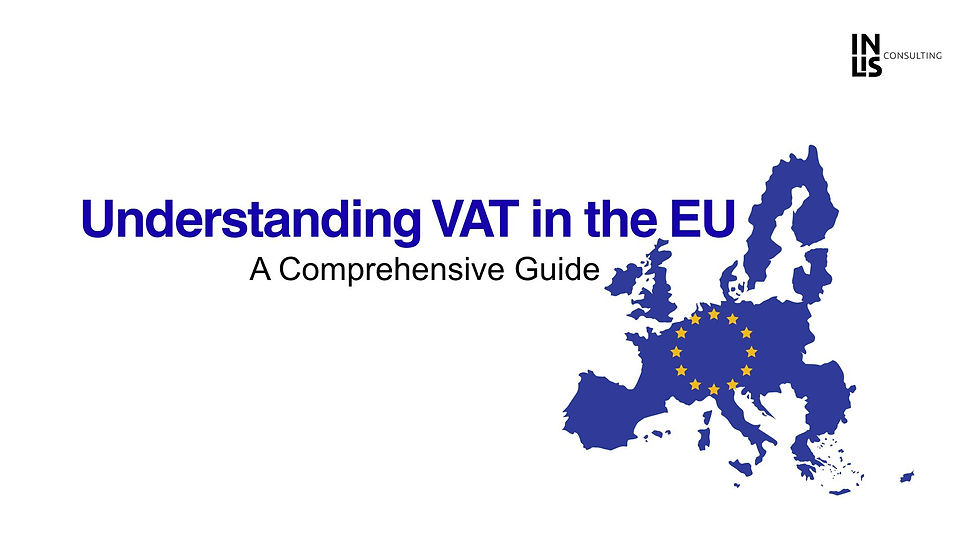EU Residency in Portugal and Germany - Guide for Dual Residents
- INLIS Consulting
- Oct 7, 2025
- 4 min read
Discover whether you can legally hold both Portuguese and German residency at the same time, how to maintain compliance in both countries, and what tax rules apply when living part-time in each.

1. Understanding Residency in the EU
European Union countries each manage their own immigration systems. Holding an EU Residency in one Schengen country (like Portugal) does not automatically grant permanent residency in another, but it allows short-term travel (up to 90 days within 180 days).
However, living or working long-term in another EU country like Germany requires its own residence permit. This means you can hold two valid residence cards, one for each country, but you must meet both nations’ legal requirements.
2. Portugal vs Germany: Residency Rules Compared
Category | Portugal (Work-Based TRC) | Germany (Spousal Residency) |
Legal Basis | Temporary Residence Card (TRC) | Family Reunification Residence Permit |
Eligibility | Valid work contract and social security registration | Marriage to a German citizen |
Application Authority | AIMA / SEF (Agência para a Integração, Migrações e Asilo) | German Embassy & Ausländerbehörde |
Absence Limit | Max. 6 consecutive months or 8 months total per year | Must reside mainly with spouse in Germany |
Renewal Period | Every 1–2 years | Every 1–3 years |
Work Rights | Allowed under work-based TRC | Full access to employment |
Main Residence Expectation | Portugal | Germany |
Tax Residency Trigger | 183+ days in Portugal or main home there | 183+ days in Germany or registered address there |
3. Maintaining Portuguese Residency While Living in Germany
If you plan to live part-time in Germany after marriage, you must protect your Portuguese residency status. Here’s how:
a. Notify SEF of Your Marriage and Address Change
Within 60 days of marriage, you are required to update SEF (Portugal’s immigration office) with your new civil status and any change of address. Failing to do so can lead to administrative penalties.
b. Respect Absence Limits
Portugal allows a maximum of 6 consecutive months or 8 months total of absence per year. To keep your TRC valid:
Visit Portugal at least once every 5–6 months, or
Request advance approval from SEF if you’ll stay longer abroad for family reasons.
c. Maintain Your Work or Income Source
If your TRC is based on employment, maintain a valid Portuguese job contract or switch to self-employed or remote work connected to Portugal. Losing your employment without replacement may affect renewal eligibility.
4. Obtaining and Maintaining German Residency After Marriage
Once married to a German citizen, you can apply for a family reunification visa and later a residence permit in Germany.
Step 1: Apply for the Family Visa
You’ll apply through the German embassy in your current country of residence (Portugal or Pakistan). You’ll need:
Passport
Marriage certificate (apostilled & translated)
German spouse’s ID
Proof of basic German (A1 level)
Proof of accommodation and health insurance
Step 2: Register in Germany
Upon arrival, register your new address at the Bürgerbüro to receive a residence registration certificate (Meldebescheinigung). This is required for the residence permit.
Step 3: Apply for the Aufenthaltserlaubnis
Apply for the spousal residence permit at your local Ausländerbehörde before your visa expires. This permit:
It is valid for 1–3 years
Can be renewed
Allows you to work without restriction
5. Dual Residency Challenges
While it’s possible to hold both permits, practical challenges can arise:
Challenge | Portugal | Germany |
Physical Presence | Must not exceed 6 months abroad | Expected to live with spouse full-time |
Renewal Basis | Proof of employment or income | Proof of cohabitation with a German spouse |
Administrative Duty | Notify SEF of changes | Register the address and renew the visa in a timely manner |
Risk of Losing Status | TRC is cancelled if absent for too long | Permit revoked if not living together |
Tip: If you plan to split time evenly between the two countries, carefully document travel, maintain both addresses, and keep employment active in one country.
6. Managing Tax Residency Between Portugal and Germany
Both countries follow the 183-day rule to determine tax residency. If you spend more than 183 days in one country, it becomes your tax home, meaning you must declare worldwide income there.
However, the Portugal–Germany Double Tax Treaty prevents you from paying taxes twice. It decides residency based on:
Where you have a permanent home
Where your center of vital interests lies (spouse, job, main address)
Where do you spend more time
If unclear, your nationality
Scenario | Tax Residency Outcome |
Spend >183 days in Portugal | Portugal tax resident |
Spend >183 days in Germany | Germany tax resident |
Split evenly between both | Determined by “center of vital interests” |
Maintain homes in both | Treaty tie-breaker applies |
If you relocate your main home to Germany, please notify the Autoridade Tributária (AT) in Portugal to update your fiscal address. You can then request a tax residency certificate from Germany to avoid double taxation.
7. Step-by-Step Plan for Transitioning Between Portugal and Germany
Step | Action | Timeline |
1 | Notify SEF of marriage and new address | Within 60 days after marriage |
2 | Maintain Portuguese presence or apply for justified absence | Ongoing |
3 | Apply for a German spouse visa | 3–6 months before moving |
4 | Register address in Germany (Anmeldung) | Within 2 weeks of arrival |
5 | Apply for a German residence permit (Aufenthaltserlaubnis) | Before visa expiry |
6 | Update the fiscal residence and tax authorities | After relocation |
7 | Renew both permits before expiration | Ongoing |
Conclusion
Holding residency in both Portugal and Germany is legally possible but practically challenging. To stay compliant, you must balance:
Physical presence requirements,
Timely renewals, and
Accurate tax declarations.
Each case depends on your personal timeline, employment, and where you spend most of your time.
If you’re planning to move between Portugal and Germany, INLIS Consulting can guide you through every step — from visa planning and SEF updates to tax optimization and residency management.




Comments